

We Were There - The Greensboro Sit Ins. YouTube-Little Rock Nine. Topic: Civil Rights Movement. Montgomery Bus Boycott. Rosa Parks Bus - The Story Behind the Bus. On December 1, 1955, Rosa Parks, a 42-year-old African American woman who worked as a seamstress, boarded this Montgomery City bus to go home from work.
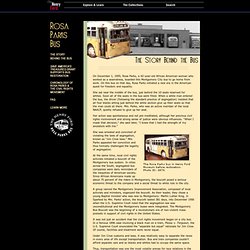
On this bus on that day, Rosa Parks initiated a new era in the American quest for freedom and equality. She sat near the middle of the bus, just behind the 10 seats reserved for whites. Soon all of the seats in the bus were filled. When a white man entered the bus, the driver (following the standard practice of segregation) insisted that all four blacks sitting just behind the white section give up their seats so that the man could sit there. Mrs. Her action was spontaneous and not pre-meditated, although her previous civil rights involvement and strong sense of justice were obvious influences. She was arrested and convicted of violating the laws of segregation, known as “Jim Crow laws.”
Civil Rights Movement Timeline (14th Amendment, 1964 Act, Human Rights Law) Jan. 23 The 24th Amendment abolishes the poll tax, which originally had been instituted in 11 southern states after Reconstruction to make it difficult for poor blacks to vote.
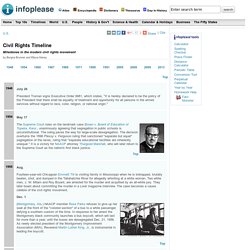
Summer The Council of Federated Organizations (COFO), a network of civil rights groups that includes CORE and SNCC, launches a massive effort to register black voters during what becomes known as the Freedom Summer. It also sends delegates to the Democratic National Convention to protest—and attempt to unseat—the official all-white Mississippi contingent. July 2. Martin Luther King Jr. - Biography. Martin Luther King, Jr., (January 15, 1929-April 4, 1968) was born Michael Luther King, Jr., but later had his name changed to Martin.
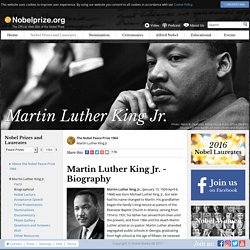
His grandfather began the family's long tenure as pastors of the Ebenezer Baptist Church in Atlanta, serving from 1914 to 1931; his father has served from then until the present, and from 1960 until his death Martin Luther acted as co-pastor. Martin Luther attended segregated public schools in Georgia, graduating from high school at the age of fifteen; he received the B. A. degree in 1948 from Morehouse College, a distinguished Negro institution of Atlanta from which both his father and grandfather had graduated. After three years of theological study at Crozer Theological Seminary in Pennsylvania where he was elected president of a predominantly white senior class, he was awarded the B.D. in 1951. Major Civil Rights Speeches and Writings. Martin Luther King, Jr.'s "Letter from a Birmingham Jail" King wrote this moving letter on April 16, 1963, while in prison for defying a state court order against demonstrating in Birmingham, Alabama.
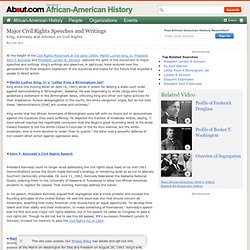
He was responding to white clergy who had published a statement in the Birmingham News, criticizing King and other civil rights activists for their impatience. Pursue desegregation in the courts, the white clergymen urged, but do not hold these "demonstrations [that] are unwise and untimely. " King wrote that the African Americans of Birmingham were left with no choice but to demonstrate against the injustices they were suffering.
John F. President Kennedy could no longer avoid addressing the civil rights issue head on by mid-1963. In his speech, President Kennedy argued that segregation was a moral problem and invoked the founding principles of the United States. Martin Luther King’s “I Have a Dream” Speech King had written a speech beforehand but deviated from his prepared remarks. On Violence and Nonviolence: The Civil Rights Movement in Mississippi. Poster, printed by the Student Nonviolent Coordinating Committee, questions the role of the Mississippi State Highway Patrol in violence against blacks.Courtesy, McCain Library and Archives, University of Southern Mississippi.
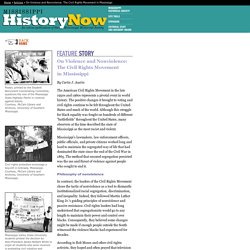
Civil rights protesters encourage a boycott in Grenada, Mississippi.Courtesy, McCain Library and Archives, University of Southern Mississippi. Mississippi Valley State University students protest the decision by then-President James Herbert White to expel all students who were involved in protesting civil injustice and curriculum issues, specifically the lack of a Black Studies program.Courtesy, McCain Library and Archives, University of Southern Mississippi. Protest march for voting rights in McComb, Mississippi.